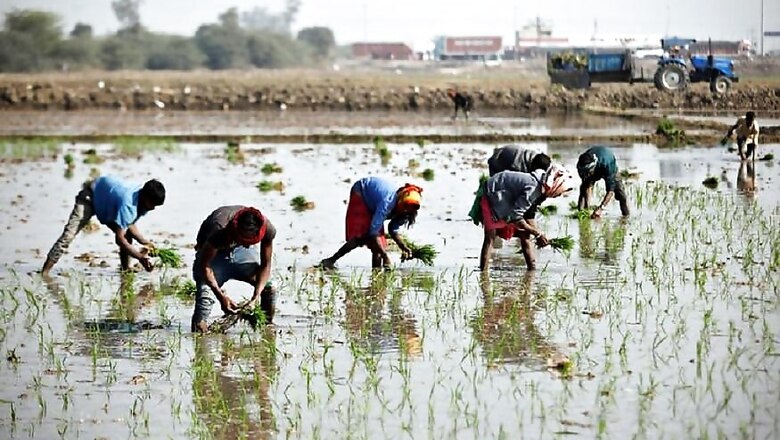
views
The Cabinet Committee on Economic Affairs (CCEA) chaired by Prime Minister Narendra Modi on Monday approved the increase in the Minimum Support Prices (MSPs) for all mandated Kharif crops for the 2020-21 marketing season.
The government also hiked the MSP of paddy marginally by Rs 53 per quintal to Rs 1,868 per quintal for the 2020-21 crop year, and the decision is expected to help farmers take a call on which kharif (summer) crop to grow as sowing picks up with the arrival of southwest monsoon. The Met Department has projected normal monsoon during the June-September period.
The government has increased the MSP of Kharif crops to ensure remunerative prices to growers for their produce. The highest increase in MSP is proposed for nigerseed (Rs 755 per quintal) followed by sesamum (Rs 370 per quintal), urad (Rs 300 per quintal) and cotton (long staple) (Rs 275 per quintal). The differential remuneration is aimed at encouraging crop diversification.
"Based on the recommendation of the Commission for Agricultural Costs and Prices (CACP), the cabinet has approved MSP of 14 crops. Paddy (common) MSP has been increased to Rs 1,868 per quintal for this year," Agriculture Minister Narendra Singh Tomar said media after the meeting, adding that the increase in support price of paddy will ensure 50% return over the cost to the farmers.
The MSP of Grade A variety of Paddy has been increased to Rs 1,888 per quintal for 2020-21 crop year from 1,835 per quintal last year.
In an official statement, the government said the support price of cotton (medium staple) has been increased by Rs 260 per quintal to Rs 5,515 per quintal for 2020-21 from Rs 5,255 per quintal last year.
The support price of cotton (long staple) has been increased to Rs 5,825 per quintal from Rs 5,550 per quintal in the said period, it added.
Finance Minister Nirmala Sitharaman last month had announced a plan to deal with India's protracted agrarian distress, including incentives for home delivery startups to aggregate products from farmers and setting up warehousing networks along highways, among other steps.
The government has set in motion plans to dismantle the decades-old monopolies of state-run Agriculture Produce Market Committees (APMCs), often blamed for unfair trading, amend the Essential Commodities Act (ECA) and frame an indicative price signalling system that a farmer can rely on at the time of sowing.
With few buyers in their local markets outside of which farmers are not allowed to hawk their produce, the glut often forces them to dump products at throwaway prices to clear up a piling mount of harvests.
The NITI Aayog, in a report titled "Raising Agricultural Productivity and Making Farming Remunerative for Farmers", said there is "a need to have a relook at some of the provisions of the Essential Commodities Act which discourage large scale private investments in agricultural markets, without diluting its basic premise of ensuring supplies of essential commodities to public and preventing exploitation by unscrupulous traders".
The agriculture reforms blueprint, which Sitharaman laid out on May 15, also includes creating a system for signalling the possible prices that a farmers’ crop will yield, a move aimed at eliminating price-related uncertainties at the time of sowing.



















Comments
0 comment